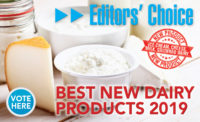Large-volume dairies often make their own plastic jugs and gallons. Take, for example, Mayfield Dairy Farms. It blow-molds its distinctive plastic yellow gallon bottles at its milk and ice cream plant in Athens, Tenn. The division of Dean Foods Co. supplies jugs to its sister plants in Alabama and Georgia.
Kroger Mountain View Foods, Denver, this magazine’s 2015 Plant of the Year, is another milk processor with on-site blow-molding capabilities. The dairy plant has one stretch blow molder using pre-forms for PET (polyethylene terephthalate) bottles and two molders for HDPE (high-density polyethylene) half-gallons and gallons.
On-site bottle manufacturing is considered to be more sustainable than trucking in finished containers. A dairy can manufacture more bottles from a trailer-load of plastic resin or pre-forms compared to the number of finished bottles that can fit into a trailer.
Small and medium-sized dairies might think that in-house manufacturing is too big of an investment. But suppliers do make equipment that is scaled for smaller production facilities and is priced accordingly.
Serac, a French company with U.S. offices in Carol Stream, Ill., designed a mono-block system called Combox, which is said to be suitable for smaller dairies. The equipment produces a bottle on the same machine where it will be filled and capped. According to Serac, this reduces operating costs by 10% to 15%. Among the reasons are: fewer machines, faster format changeovers, lower energy consumption, and savings in labor, raw materials and spare parts.
Serac also makes a single-block machine. The SBL is capable of producing bottles up to 5 liters (about 1.3 gallons). Depending on model configuration and bottle size, the SBL can reach speeds of up to 18,000 containers per hour.
The SBL has been specifically designed to optimize energy consumption. Heating of the preforms is performed at low temperature and evenly distributed using reflecting panels and independently adjustable lamps.
Heating with electrical resistance
Another equipment maker also combines blowing, filling and capping functions in one machine. In November, Sidel (part of the Swiss-based Tetra Laval group, with a U.S. office in Norcross, Ga.) came out with the Matrix blower to produce hot fillable PET bottles. The equipment can accommodate a broad range of beverages with and without pulp or particles.
“Hot filling,” the company notes, “is a method of safely bottling sensitive beverages like juices, nectars, soft drinks, isotonics and teas by heating them.” This heat sterilizes the beverage. Once the bottle is filled, capped and tilted, then the bottle and cap are sterilized. The temperature required (between 80C and 95C/176F and 203F) is above the normal thermal resistance of conventional PET bottles.
By heating the mold with electrical heat resistance (EHR) instead of oil, the blower achieves various benefits, including bottle quality, performance, process flexibility, uptime, energy savings and operator safety, according to Sidel. EHR is said to reach the required temperature three times faster than oil, which is traditionally used to heat molds.
Mechanical output is increased by up to 2,000 bottles per hour per mold, representing a speed improvement of more than 10% compared with the previous generation of Sidel HR blowers. Electrical heating offers energy savings of up to 45% compared with the previous generation of the company’s blowers. Infrared lamps and ceramic technology also reduce the use of power by a further 25%. By implementing the company’s air recovery option, air consumption can be reduced by up to 45%, according to Sidel.
Hygiene and safety
With no oil needed to heat the molds, the blower eliminates issues caused by leakages. The risk of contamination is also eliminated because electrical stretching does not use lubrication above the neck of the bottle, the company claims.
Find suppliers of blow-molding equipment in the Dairy Foods Buyers' Guide.
Watch a video that explains three blow-molding techniques: extrusion, injection and stretch.
Note: This article was updated on Dec. 14, 2015 to note that Serac's SBL machine is capable of producing bottlers up to 5 liters (not 8 as stated in the original). The company had provided outdated information to Dairy Foods.











